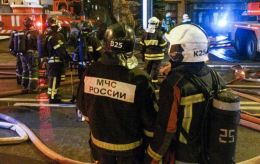Israeli analyst Arkady Mil-Man: 'Trump is losing interest in Ukraine and Israel'
 Arkady Mil-Man (photo: inss.org.il)
Arkady Mil-Man (photo: inss.org.il)
Israeli diplomat and analyst, Arkady Mil-Man, told RBC-Ukraine in an interview about the parallels between Trump’s negotiations with Russia and Iran, how this may affect his diplomatic efforts regarding Ukraine and the Middle East, and what the consequences might be if Iran obtains nuclear weapons.
Tomorrow, April 12, negotiations between the US and Iran on the nuclear program will take place in Oman. These talks are significant in several contexts. Firstly, in light of security in the Middle East, because a nuclear Iran could become more aggressive and pose new threats to Israel. Secondly, Iran’s actions could undermine the nuclear non-proliferation regime at a time when global interest in such weapons is growing.
However, there are pitfalls that could impact the negotiations, said Israeli diplomat Arkady Mil-Man, former ambassador to Russia and head of the Russia Studies Program at the Institute for National Security Studies in Tel Aviv, in a brief interview with RBC-Ukraine.
At the same time, not only the starting positions of the parties are important, but also the psychological traits of US President Donald Trump, which were evident during the negotiations to end Russia’s war against Ukraine. In conversation with the agency, Mil-Man also touched on how the US President conducts talks on both of these fronts, and to what extent he considers Israel’s position in the process.
Key takeaways:
-
There is a decline in Trump’s attention to negotiations on ending Russia’s war against Ukraine;
-
Trump is also paying less attention to negotiations on the release of Israeli hostages held by Hamas;
-
Trump’s tendency to lose interest in certain issues can be exploited by Russia and Iran;
-
Iran has not yet acquired nuclear weapons, but if it does, it will pose a serious threat to the Western world.
— It seems that Trump has lost focus on talks to end Russia’s war against Ukraine and has shifted to Iran, trade wars, and other topics. Is this true?
— We’re seeing a completely different level of engagement in the negotiation process on Ukraine.
If in previous weeks we regularly saw meetings, talks about achieving a ceasefire, now there is a sharp drop in active efforts to resolve the issues Trump set out for himself regarding the war in Ukraine. We’re not seeing that the ceasefire is being observed, and it is not fully understood. There are no statements from Trump or his team.
So it really seems that Trump and his administration's attention is now focused on other objects and other topics. And as for these other topics:
Netanyahu’s visit to Washington on April 7 - if we pay attention, there was hardly any talk about Ukraine during his interactions with journalists. And even on the Middle East issues, which are of great concern to Netanyahu, nothing was said at all.
Or Trump talked a lot about normalizing (of relations - ed.) with Saudi Arabia.
Trump and members of his administration spoke a lot about how normalization between Israel and Saudi Arabia would be achieved, and how the so-called Abraham Accords would be expanded. Netanyahu is sitting there — for him, this is a central issue, and not a word was said. It gives the impression that Trump very quickly loses interest in the topics he initially focuses on.
Another subject that suddenly faded from the scene is the Israeli hostages held by Hamas. Trump said that if all the hostages weren’t released, then hell would break out. Some hostages were freed by the Hamas terrorists, but 59 still remain there, of whom, quite possibly, only a portion are alive. The rest are hostages who were killed by Hamas and whose bodies are still being held. And again, we are not seeing any serious activity or statements on this matter. Once again, it’s faded into the background. And that’s sad.
— On April 12, talks between the US and Iran will take place. Could Iran exploit this, just as Russia is doing now?
— We don't know yet whether these will be direct negotiations or mediated talks. The US side claims that there will be direct negotiations. Witkoff even stated that if there are no direct talks, he won’t attend the meeting at all. The Iranians claim that there will be no direct talks; they will negotiate through intermediaries – Oman. So, they will not sit opposite each other, but will talk through intermediaries.
We do not know for sure whether this is true or not. There is a surge of some statements in the information space. It is difficult to assess this, and we will only find out later what will happen and how. We’ll see footage, there will be some leaks, and only then will we understand.
That Iran will take advantage of this is inevitable, just as Russia has taken advantage of the fact that the Trump administration initiated the negotiation process with Russia. Similarly, the Trump administration is initiating negotiations with Iran.
This is natural and not at all surprising to us. The real question is how actively the US administration will engage and whether it will lead to some kind of result that it is trying to achieve.
In all likelihood, the issue related to Iran is the desire to reach some sort of agreement that would limit Iran's nuclear program for military purposes. Israel's goal is clear – to completely dismantle Iran’s nuclear program. Trump has spoken about this, but we still don’t fully understand what that means.
Netanyahu clearly didn’t expect Trump to say what he did during the semi-press conference when journalists asked questions in the White House Oval Office. Netanyahu was surprised by Trump’s remarks; he clearly wasn’t aware of them. This is because, in my view, Netanyahu’s main goal was to convince Trump that bombing Iran and its nuclear program was necessary. But instead, the conversation took a completely different direction. So, we’ll see how events unfold from here.
– Do you think Trump is ready to use force against Iran?
– Based on the statements coming from the White House, it seems like he is ready. But whether it will happen or not is difficult to say. We remember that Trump made various statements and then denied them. One of the most famous examples is when he called Zelenskyy a dictator, and then he told journalists, "Did I say that? That can’t be, it wasn’t me." So, it’s hard to say whether he truly plans to use force or not.
The same goes for Hamas: "If the hostages are not released, hell will break out." But so far, hell hasn’t broken out. So, it’s really hard to say what Trump’s decision will be and whether his statements will match the political actions he has announced.
– From Israel’s perspective, how likely is it that Iran will eventually acquire nuclear weapons? And what could the consequences be?
– First of all, Iran does not have nuclear weapons yet. They are on the verge of creating nuclear weapons. According to various estimates, this could happen within a few weeks. That is, they will reach a certain level of enrichment of materials from which an atomic bomb can be made.
The next question is how this atomic bomb will be used. Will these be bombs that aircraft launch? Or will they be nuclear warheads on missiles with a specific range? Iran could face different issues in this regard. It is not a given that they will be able to create nuclear warheads in the near future that could be carried by missiles of different ranges. Or bombs that could be attached to aircraft.
It’s important to note that Iran’s air force is outdated. These aircraft might not be able to carry such weapons at all. So, there are many stages left before this weapon can be operational.
But the mere fact of creating atomic weapons poses a huge and serious threat to the entire Western world. And specifically, or primarily, it is a threat to Israel. Therefore, the Israeli government must act very quickly, in a coordinated and efficient manner, to prevent Iran from having nuclear weapons in its arsenal.
And practically everything will depend on Trump, because the United States remains, as before, the most important and powerful player on the world stage.

